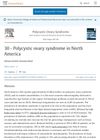5 citations,
October 2017 in “JOGC/Journal of obstetrics and gynaecology Canada” The conclusion is that proper diagnosis and long-term treatment, including medication, hair removal, and lifestyle changes, are important for improving hirsutism, especially in PCOS patients.
 4 citations,
August 2021 in “Clinical and Experimental Reproductive Medicine”
4 citations,
August 2021 in “Clinical and Experimental Reproductive Medicine” The 2018 guideline for PCOS suggests new diagnostic criteria and treatments, but recognizes the need for more research.
 2 citations,
July 2012 in “Journal of Pediatric and Adolescent Gynecology”
2 citations,
July 2012 in “Journal of Pediatric and Adolescent Gynecology” A 12-year-old girl with very high testosterone and insulin resistance improved with birth control pills, suggesting PCOS can cause high testosterone without tumors.
2 citations,
July 2012 in “Obstetrics, gynaecology and reproductive medicine” Hirsutism in women often indicates health issues like polycystic ovarian syndrome and is treated with lifestyle changes, medication, and cosmetic measures.
 1 citations,
October 2015 in “Journal of endocrinology and diabetes”
1 citations,
October 2015 in “Journal of endocrinology and diabetes” Understanding Polycystic Ovary Syndrome (PCOS) and its causes can lead to effective treatments.
1 citations,
July 2006 in “Reviews in gynaecological and perinatal practice” The document concludes that hirsutism in women, often caused by PCOS, requires systematic evaluation and can be treated with medications, mechanical removal, or cosmetic methods, with weight loss also being beneficial.
April 2024 in “Journal of clinical medicine” Effective treatment guidelines for frontal fibrosing alopecia are still unclear.
 December 2023 in “Acta dermato-venereologica”
December 2023 in “Acta dermato-venereologica” Tofacitinib is effective for treating alopecia areata, and starting treatment early may improve results.
 November 2023 in “L'Endocrinologo”
November 2023 in “L'Endocrinologo” Women with PCOS are more likely to experience sexual dysfunction, but lifestyle changes and weight loss can improve sexual function.
 April 2023 in “Elsevier eBooks”
April 2023 in “Elsevier eBooks” PCOS is a common and costly condition in North American women, causing various health issues like obesity, diabetes, and fertility problems.
 April 2023 in “Expert opinion on pharmacotherapy”
April 2023 in “Expert opinion on pharmacotherapy” Birth control pills and antiandrogens are the most effective medicines for excessive body hair in women, but combining them with other treatments and psychological support is best.
 September 2022 in “Women's healthcare”
September 2022 in “Women's healthcare” PCOS is managed by lifestyle changes and personalized medication to improve symptoms and fertility.
May 2021 in “Journal of the Endocrine Society” Adolescents with PCOS have higher levels of certain androgens, which are linked to hair growth but don't help diagnose PCOS better than testosterone levels.
 April 2021 in “Interciencia médica”
April 2021 in “Interciencia médica” PCOS is a common condition in women that causes various symptoms and health issues, treatable with lifestyle changes and medication.
January 2021 in “Voprosy ginekologii akušerstva i perinatologii” Effective management of hyperandrogenism in young women requires accurate diagnosis and tailored treatment.
April 2020 in “BMC endocrine disorders” A woman with childhood growth hormone deficiency had multiple hormone deficiencies and developed serious lung and kidney problems later in life.
 January 2020 in “Przegla̧d dermatologiczny”
January 2020 in “Przegla̧d dermatologiczny” The conclusion is that hirsutism in women can be managed with hair removal techniques, medications, and topical treatments.
 May 2019 in “Paediatrics and child health”
May 2019 in “Paediatrics and child health” The document concludes that personalized treatment, including lifestyle changes and medication, is essential for managing PCOS in teenagers, while also addressing their psychological well-being.

PCOS is a common hormonal disorder with symptoms like irregular periods and excess hair growth, managed with lifestyle changes and medications.
 October 2016 in “Journal of the Dermatology Nurses’ Association”
October 2016 in “Journal of the Dermatology Nurses’ Association” Polycystic Ovary Syndrome (PCOS) affects 6%-15% of women of reproductive age, causing symptoms like acne and hair loss, and increasing the risk of type 2 diabetes and heart disease; it's managed through diet, exercise, and medications like Metformin and hormonal contraceptives.
 June 2016 in “The Egyptian Journal of Fertility and Sterility”
June 2016 in “The Egyptian Journal of Fertility and Sterility” The study concluded that personalized treatment, including medical and cosmetic approaches, is effective for women with PCOS and hirsutism.
June 2015 in “Obstetrics, gynaecology and reproductive medicine” Hirsutism, excessive hair growth in women, is often caused by polycystic ovarian syndrome and is treated by targeting the cause, lifestyle changes, and medication.
 September 2011 in “American Journal of Clinical Dermatology”
September 2011 in “American Journal of Clinical Dermatology” The birth control pill containing ethinylestradiol and chlormadinone may help treat acne and other skin and hair conditions related to hormones.
 August 2010 in “Springer eBooks”
August 2010 in “Springer eBooks” Hormonal contraceptives are effective for teens but require careful consideration of side effects and individual health.

A young woman with kidney failure had hair loss due to a common hormonal disorder, which improved with hormone therapy.
 March 2007 in “Journal of Obstetrics and Gynaecology Canada”
March 2007 in “Journal of Obstetrics and Gynaecology Canada” Birth control pills slightly increase the risk of breast cancer, especially if used before the first full-term pregnancy.
 May 2002 in “Australasian Journal of Dermatology”
May 2002 in “Australasian Journal of Dermatology” Finasteride is effective for male hair loss, teledermatology is accurate and accepted, and cyclosporin helps treat toxic epidermal necrolysis.
Oral contraceptives are generally recommended for healthy young girls, but specific types may vary based on individual health conditions and barrier methods are less popular among adolescents.
 September 2015 in “Korean Journal of Clinical Pharmacy”
September 2015 in “Korean Journal of Clinical Pharmacy” Dutasteride is highly effective for hair loss treatment in Korea, with more side effects than finasteride.
 57 citations,
March 2011 in “Pediatric Dermatology”
57 citations,
March 2011 in “Pediatric Dermatology” Nearly half of children with primary immunodeficiency disorders showed skin problems, often as the first sign of their condition.




















